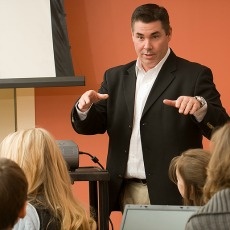There are many studies that look at how online students differ from those in face-to-face classes in terms of performance, satisfaction, engagement, and other factors. It is well-known that online course completion rates tend to be lower than those for traditional classes. But relatively little is known about what the unsuccessful online student has to say about his or her own experience and how they would improve online learning. Yet these insights can be vital for distance educators.
Read more ›CURRENT ARTICLE • November 14
OTHER RECENT ARTICLES
According to John Tropman, professor of social work at the University of Michigan and author of Making Meetings Work: Achieving High Quality Group Decisions, well-run meetings consist of three elements: announcements, decisions, and brainstorming. This straightforward structure belies the lived experience of many who endure long, seemingly pointless meetings that accomplish little.
Read More › One of the best gifts teachers can give students are the experiences that open their eyes to themselves as learners. Most students don’t think much about how they learn. Mine used to struggle to write a paragraph describing the study approaches they planned to use in my communication courses. However, to be fair, I’m not sure I had a lot of insights about my learning when I was a student. Did you?
One of the best gifts teachers can give students are the experiences that open their eyes to themselves as learners. Most students don’t think much about how they learn. Mine used to struggle to write a paragraph describing the study approaches they planned to use in my communication courses. However, to be fair, I’m not sure I had a lot of insights about my learning when I was a student. Did you?
Every October, members of the Canadian Forces College’s National Security Program—a master of public administration program for senior military personnel and senior public service professionals—have the opportunity (and privilege) to travel to Ottawa to meet with high-level policy practitioners. The intent of the trip is to allow our students to compare what their in-class readings have taught them about governance and executive leadership with what actually happens in the national capital on a daily basis.
Read More ›My office is on the first floor of the education building. I have spent 27 years in this building. Unless I have a meeting in another department, I rarely go upstairs. Recently, however, I started a daily routine of climbing the four sets of staircases in the building. Trying to slow the progression of osteoporosis in my right hip, I go up one set and down another three times as I make my way around the building. This physical activity has given me a chance to engage in some mental reflection. Here I will briefly share five observations on a career spent teaching in higher education with an eye toward encouraging newer faculty to achieve longevity in the profession.
Read More ›“A threshold concept is discipline-specific, focuses on understanding of the subject and ... has the ability to transform learners’ views of the content.” (Zepke, p. 98) It’s not the same as a core concept, although that’s a useful place to first put the idea. “A core concept is a conceptual ‘building block’ that progresses understanding of the subject; it has to be understood, but it does not necessarily lead to a qualitative different view of the subject matter.” (Meyer and Land, p. 4)
Read More ›Difficult conversations are inevitable in any organization. Understanding how they arise and how they play out can help minimize the disruption without avoiding the issue or alienating those involved.
Read More ›“I just stumbled onto this. . .” I heard the phrase a couple of times in presentations during the recent Teaching Professor Technology Conference. Faculty presenters used it to describe their discovery of an aspect of instruction that worked well, such as an assignment detail or activity sequence. Since then I’ve been thinking about accidental learning and the role it plays or might play in the instructional growth of teachers.
Read More › Most online faculty know that discussion is one of the biggest advantages of online education. The increased think-time afforded by the asynchronous environment, coupled with the absence of public speaking fears, produces far deeper discussion than is usually found in face-to-face courses.
Most online faculty know that discussion is one of the biggest advantages of online education. The increased think-time afforded by the asynchronous environment, coupled with the absence of public speaking fears, produces far deeper discussion than is usually found in face-to-face courses.
 As we face the perpetual challenge of keeping each class session fresh and interactive, I suggest we consider an old idea that never really got stale. Inviting guest lecturers to your classroom has benefits for your learners, for you, and for the guest lecturers. Learners of all ages and experience levels are hungry for variety, and seeing a new face in front of the room can liven up the class; but there are also deeper pedagogical reasons for using guest lecturers. Here are a few to consider.
As we face the perpetual challenge of keeping each class session fresh and interactive, I suggest we consider an old idea that never really got stale. Inviting guest lecturers to your classroom has benefits for your learners, for you, and for the guest lecturers. Learners of all ages and experience levels are hungry for variety, and seeing a new face in front of the room can liven up the class; but there are also deeper pedagogical reasons for using guest lecturers. Here are a few to consider.






